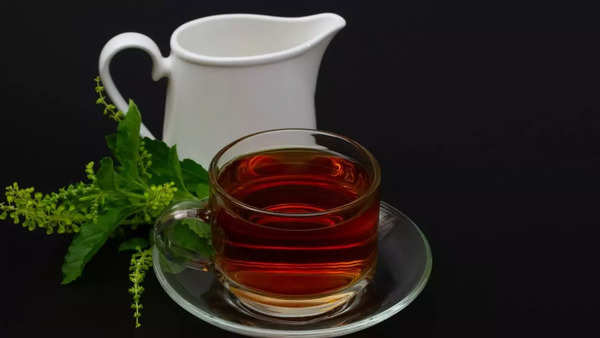Every part of the Tulsi plant, also known as Ocimum sanctum Linn in Latin, is used in traditional medicine including its leaves, stem, flower, root, seeds, etc.
Tulsi leaves can be chewed for instant relief from cough and cold, or the leaves or seeds can be added to the boiling water and strained for a flavourful tea. Tulsi can also be soaked in warm water and the infused water can be consumed every day on an empty stomach. Holy basil leaves can also be used for garnishing salads, cheese, meat, pesto and egg dishes.
Benefits of Tulsi water
Cold, cough and sore throat
Tulsi is particularly useful in the rainy season as its leaves can be boiled with tea and water as a remedy to cure fever from illnesses like dengue, malaria and seasonal flu. Tulsi leaves can also be added to honey as an Ayurvedic cough treatment as it can help release mucus in respiratory disorders. Tulsi can also provide relief from sore throat. Tulsi leaves can be boiled with water and consumed or Tulsi water can also be used as a gargle.
Improves kidney health
Tulsi’s many healing properties can also be beneficial for patients with kidney stones. People with renal stone are advised to consume juice of its leaves along with honey. As per Ayurveda, it can be given for six months to help remove the stone through the urinary tract.
Prevents blood sugar spikes
Tulsi can help reduce fasting glucose levels, blood cholesterol and triglycerides in people with diabetes. According to studies published in Global Science Research Journal, having two to three tulsi leaves or one tablespoon of tulsi juice on an empty stomach can help lower blood sugar levels. Another one found that tulsi consumption can significantly lower fasting blood glucose levels.
Helps treat skin infection
Tulsi’s anti-bacterial, anti-inflammatory and anti-viral properties are also beneficial in treating skin infections. Application of tulsi juice helps treat fungal infections and other types of skin disorders. It can also be used to cure leukoderma.
Eases stress

Tulsi is known to be an Adaptogenic which helps to manage mood swings and promote calmness and mental clarity. It raises the body’s ability to adapt to changing situations
Heart health
Holy basil is a storehouse of vitamin C and antioxidants such as eugenol, which protects the heart from the harmful effects of free radicals. Its antioxidants content is equivalent to that of ginger, garlic, red grapes and plums.
Lowers blood pressure
Holy basil is an Ayurvedic remedy for a range of disorders, including lowering blood pressure. It is rich in potassium, vitamins A and C. For effective results, it is recommended to consume holy basil on an empty stomach every day for four to six weeks.
Effective Home Remedies to Soothe and Heal Burnt Mouth

